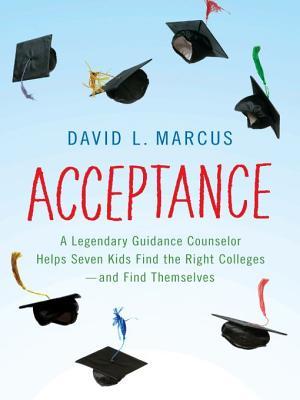
Acceptance
A Legendary Guidance Counselor Helps Seven Kids Find the Right Colleges--and Find Themselves
- اطلاعات
- نقد و بررسی
- دیدگاه کاربران
نقد و بررسی

July 6, 2009
The college application process is a time of major anxiety for high school seniors and their parents. Fortunately for all concerned (including administrators, teachers, and private coaches), Marcus, the Pulitzer Prize–winning education writer for U.S. News and World Report
, has documented the year he spent at suburban Long Island's Oyster Bay High School closely observing the rather unorthodox college counselor Gwyeth Smith and seven college-bound seniors. In this insider's look at the college application process, Marcus reveals the personal realities the kids and their parents face, the way college decisions are made and how and why Smith manages to ease the powder keg of worry and emotions with good advice, eventually helping make the “right match” for each student. Readers meet all kinds—the kid who doesn't test well; the one who is depressed after an early admission rejection; the high-achieving Asian-American at odds with his parents; the good girl looking for something “different”; the athlete with mediocre grades. In sometimes the most counterintuitive ways, Smith helps them by demonstrating how each has the ability to write good application essays, find their true “passion” and represent themselves as people colleges will want to accept. A wonderfully enjoyable antidote to the spate of books focused on the college admissions “game” of “getting in.”

June 1, 2009
Another look at the college-admissions process—this time through the experiences of an influential Long Island guidance counselor and seven of his students.
When Pulitzer Prize–winning education reporter Marcus moved from U.S. News& World Report to Newsday, he noticed that the area's highest acceptance rates were coming from a relatively small, unknown school—the diverse Oyster Bay High School—and that the mitigating factor was an especially committed counselor named Gwyeth"Smitty" Smith. To determine what made Smitty so successful, Marcus followed him through the process, focusing in particular on seven students. There was the underachieving athlete with the big heart and difficult home life; the engineering hopeful with an overbearing mother; the well-rounded Jewish girl who worried that she wouldn't stand out; the overworked African-American who would be the first in her family to go to college; the intellectual Korean-American who wasn't sure he could live up to his family's expectations; the free-spirited girl who couldn't focus; and the valedictorian who never had to worry. Marcus's portraits are honest and interesting, and some of the outcomes are quite surprising, thanks in part to the counselor who encouraged the students to think outside the box, even when it meant defying parents or preconceived notions about reputation. Smitty is clearly an excellent counselor who goes to great lengths to make sure his students make the right choices—negotiating work hours with a student's employer to make sure she had enough time to study, seeking out admissions officers at conferences to talk about specific students. But while it's encouraging to read about a counselor more committed to the students' well-being than the number of Ivy League acceptances on his rap sheet, there's nothing particularly revolutionary or illuminating about his practices, and readers may struggle to find a takeaway message that hasn't been covered in countless other college-admissions books—including Jacques Steinberg's The Gatekeepers (2002) and by Jay Mathews's Harvard Schmarvard (2003).
Engaging and inspiring, but without significant purpose in an overcrowded topic.
(COPYRIGHT (2009) KIRKUS REVIEWS/NIELSEN BUSINESS MEDIA, INC. ALL RIGHTS RESERVED.)

June 15, 2009
In this aptly titled book, award-winning journalist Marcus ("What It Takes To Pull Me Through") chronicles the efforts of acclaimed guidance counselor Gweyth (pronounced to rhyme with Faith) "Smitty" Smith and seven students to find the best colleges for them. Marcus's revealing group portrait aims to drive home the point that a college's reputation matters less than students' ability to "fit" successfully into its social and academic culture. While Marcus writes that his purpose for profiling Smith was to see how one man teaches students to play the "admissions game" in "the way that charts the best course for their lives," it also appears to be a testament to the therapeutic qualities of writing, highlighting the self-discovery students find through a college essay-writing course. This refreshing look at the college admissions process reads like a novel and is likely to shock parents and overachievers who cling to the notion that admittance is dependent only upon class rank and test scores. VERDICT Marcus's poignant book will have readers wishing that they too had had Smitty as a guidance counselor and rooting for the students profiled. Highly recommended for parents and college-bound students as a good alternative to the standard college admission guides.Tamela Chambers, Chicago P.L.
Copyright 2009 Library Journal, LLC Used with permission.




دیدگاه کاربران